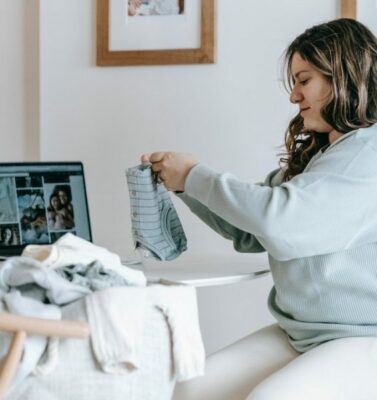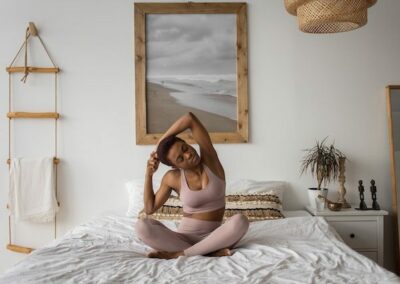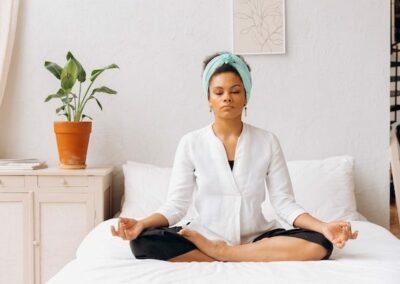 You can have all the treasures and riches of the world, but if you can’t have a good night’s sleep, they’re all worth nothing! Sleeping well at night is a sign of a clean heart and a healthy body, and it also works the other way – poor sleep can ruin your mood and health.
You can have all the treasures and riches of the world, but if you can’t have a good night’s sleep, they’re all worth nothing! Sleeping well at night is a sign of a clean heart and a healthy body, and it also works the other way – poor sleep can ruin your mood and health.
You may have heard a lot about the benefits of good sleep and the consequences of not sleeping well. While it may seem ideal to doze off as soon as your head hits the pillow, the truth is that only cartoon characters can do that! Poor sleep can affect every aspect of your life and can also be life-threatening.
For us mortals living real, stressed lives in the modern world, we must prepare to sleep well before lying down. What we do in the hours preceding our bedtime significantly affects how well we can rest. And that’s what brings us to the bedtime routine.
Simply put, a bedtime routine is a set of tasks or activities you do an hour or two before bed. We often have bedtime routines for our babies and kids, but adult bedtime routines will look a little different, although the effect is the same!
Tips on how to get good sleep
If you’re wondering how to put together a good bedtime routine that you can perform consistently every night, here are our tips for creating a custom bedtime routine that suits your current lifestyle. Here are some tips you can follow for great sleep.
1. Eat an early dinner

We’ve all experienced that feeling of having stuffed ourselves beyond our capacity and tossing uncomfortably in bed, unable to sleep. Prevent this by having your dinner at least a couple of hours before you intend to sleep. And keep it light – heavy meals can cause problems like acid reflux or indigestion.
On the same note, cut down on fluids after 6 PM unless you want to keep running to the bathroom in the middle of the night! Have your last caffeine-filled drink 8 hours before bed – it takes that long for the caffeine to metabolize. Avoid alcohol close to bedtime, too, as it can interfere with sleep.
2. Turn down the lights

It’s time for our bodies to start preparing for sleep, and light plays a crucial role. As soon as it’s evening, draw the curtains close – this creates a cozier atmosphere. Get dimmer lights so you can reduce the intensity as night sets in. If that’s difficult, turn off harsh overhead lights and light lamps or other accent ‘warm’ lights. They signal to your brain that it’s time to wind down, relax, and create a nice atmosphere for the evening.
3. Get your bedroom ready

It’s hard to fall asleep when messy tables, unwashed clothes, and other clutter surround you. Prep your bedroom to make it the peaceful sanctuary you need. Put away things in their proper places and remove anything that shouldn’t be in your bedroom – including the TV.
Ensure you have clean sheets and fluffed-up pillows, so your bed looks more cozy and comfortable. Set the mood for a relaxed bedtime by diffusing a scent you like, like lavender. You can also spray a pillow mist on your bedding or night clothes.
4. Prepare for the next day

Have you heard about ghosts who can’t cross over because they have unfinished business? Well, it’s the same with us – we can’t sleep when we’ve got dirty dishes in the sink or heaps of laundry for tomorrow! Settle all your unfinished tasks so you can rest well, knowing your morning will start on the right note. Prep your breakfast, keep your clothes for the day out, gather everything you need, and do anything that’ll make your morning easier.
5. Switch off all devices

You’ve heard it before, but we’ll repeat it – turn off all your devices! Electronic devices emit blue light that messes with your melatonin production, affecting your body’s natural sleep-wake cycle. As a result, your brain is confused about whether it’s night or day, making it harder to wind down for sleep.
Devices refer to everything – televisions, smartphones, tablets, and computers. You can set a timer on your phone or tablet to activate ‘night mode’ at a specific time every night. This will change your device’s backlight and make it easier on your eyes should you have to look at your device for anything.
6. Have a bedtime beverage (or snack)

Yes, it is not advisable to have a heavy meal right before bed, but it isn’t recommended to go to sleep hungry, either. Hunger pangs can make it hard to sleep and wake you up if your dinner is very light and quite early, have a small snack before bed, like some fruit, nuts, or yogurt. Another excellent option is a herbal tea that can help induce sleep, like chamomile or lavender. Another bedtime drink I enjoy is Sleep Like a Baby by Cosmix. It is a plant-based superfood sleep supplement packed with the goodness of cinnamon, jatamansi, and turmeric. All of these are ingredients that help your mind and body to unwind and calm down.
Write down a to-do list.
One of the main reasons most of us lie in bed tossing and turning is because our mind is swimming in all the tasks that need to be done. Clear out your mind by putting down all those tasks on paper. Write a to-do list before bed, listing everything on your mind, even if it’s something small and insignificant. Your intention is to empty your mind, giving your brain the feeling that everything is ‘taken care of’ for now, and you can sleep better knowing everything is under control.
8. Write in a journal

Many productivity experts recommend doing a ‘landing the plane’ activity at the end of the day. Journaling is the best way to do this, where you just let your thoughts flow for a page or two. Remember, this isn’t the same as a to-do list; this is more of an outlet for your feelings, giving your brain a chance to process all the emotions of the day and perhaps giving some closure to anxious thoughts. Studies have shown that regular journaling before bed significantly improves sleep quality and helps people fall asleep faster.
9. Take a warm bath

Temperature is essential to sleep hygiene and can make or break your night’s rest. We tend to sleep better in cooler temperatures, and a warm bath can help. When you shower or soak in warm water, your body’s temperature rises, and as you dry, it cools down fast – creating the ideal situation to trigger sleepiness. Take it up a notch by using a shower gel or bath salts in a pleasant fragrance like lavender. When I bathe, I add a spoonful of pink rock salt and a few drops of a soothing EO as a final rinse.
10. Take care of your skin

Yes, your skincare routine can also affect your sleep! When you wash your face, taking the time to massage your skin has a therapeutic effect making it feel like you’re washing away all the stress of the day. It also works like a bath – the drying of the skin cools it down and makes you feel sleepier.
Skin care also includes your night cream, and taking the time to slowly massage your face and neck with the cream can be very relaxing, not to mention great for your skin. If you have time, include a message with a gua sha stone or jade roller or apply a hydrating sheet mask.
11. Change into comfortable sleepwear

Our babies and kids change into cute pajamas before bed, so why shouldn’t we have that joy too? When you change into a different outfit for bed and do it consistently, it automatically sends your brain the message that it’s time for bed.
Comfortable sleepwear also has practical purposes – you’ll sleep better if you’re not bothered by itchy seams, protruding buttons, or non-breathable fabrics. Choose a fabric appropriate for the season, and go for a loose fit in colors you like.
12. Get the proper noise

Contrary to what many think, pin-drop silence is not conducive to good sleep. It can make you more anxious. If you need extra help to wind down or have had a tough day, play some soft, relaxing music that can calm your nerves. It is recommended to choose music without lyrics, or you can also play nature sounds like waterfall sounds or whale songs.
Try white noise if music isn’t your idea of relaxing for good sleep. A fan’s whirring works well, or you could get a white noise machine. An advantage of this is that it can also drown out other annoying noises outside.
13. Do a short relaxing stretch

Whether you’ve exerted a lot physically or have been stiff from sitting all day, a good stretch can help relax those muscles and your mind. You can find many quick 10-minute bedtime stretches on YouTube or try a few yoga poses. Some good poses for sleep are Child’s Pose, Happy Baby, Knees to Chest, Reclining Spinal Twist, or Reclining Cobbler Pose.
14. Pray or meditate

You can pray according to your beliefs or do meditation practice. This is something that many people find to be soothing, especially before bed. It’s not as complicated as it seems, and if you’re a beginner, you can start by sitting cross-legged on your bed and closing your eyes. Breathe deeply and focus on your thoughts, allowing them to pass by one by one. Use visualization to think of a calm scene, focusing on minor details, and you’ll soon feel sleepy.
15. Read something non-stimulating

Remember those days when we sat down to study and immediately dozed off? Well, that is a superpower you can bring out now! Pick a book that’s not stimulating – avoid murder mysteries – and settle down with it. Go with paper books if you can, or if you use an e-reader like the Kindle, use the night mode option to avoid the light glare. With just a few pages in, you’re likely to start dozing off.
How to set your custom Bedtime Routine
Reading all these tips at once can be overwhelming, and it can be confusing to think of where to start. Here are some tips on how to get sleep and to help you create your custom bedtime routine.
- Decide when you want to sleep and when you want to wake up.
- Set an alarm on your phone to remind you to start your bedtime routine.
- Calculate backward from your sleep time; this is when you should start your bedtime routine.
- Make a list of the activities you want to include in your bedtime routine. Add only one new activity at a time till it becomes a habit.
- Note how much time each activity in your bedtime routine will take. Add it up to see how long your entire routine will take. It should be somewhere between 30 minutes and 2 hours.
Follow this routine every night for at least a month to let it become a habit. When you’re in the initial stage of setting a bedtime routine, try to be consistent, even on weekends. This will make the process easier and more automatic for your body and mind. Try to get your family involved; you can do many things together, like prepping for the next day or reading before bed. Done together, the routine is more likely to stick, and you’ll also go to bed feeling happier, more contented, and definitely more sleepy!


Leave a Reply